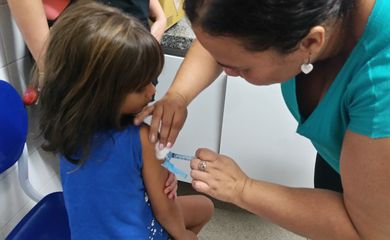Brazil to vaccinate 11 million children against measles, polio
As of next Monday (Aug. 6), all children aged one through five in Brazil must be taken to health care stations to be vaccinated against poliomyelitis and measles. The initiative’s D-Day was slated for Saturday, August 18, with agents mobilized throughout the country, but the campaign continues up to the end of the month. The government’s goal is to have 11.2 million children immunized and to cover at least 90 percent of the people within this age group, as recommended by the World Health Organization (WHO).

According to figures from the country’s Health Ministry, 28.3 million doses of both vaccines were purchased, costing a total of $42.8 million. Brazilian states have already been supplied with 871.3 thousand doses of the Inactivated Polio Vaccine (IPV), 14 million doses of the Oral Polio Vaccine (OPV), and 13.4 million of the combined vaccine against measles, mumps, and rubella (MMR).
This year’s vaccination campaign has no restrictions—all children in the aforementioned age group are to be immunized.
Vaccination efforts are back with full force in Brazil as previously eradicated diseases have once again sparked concern among health authorities. Up to now, 822 cases of measles have been confirmed—590 in Amazonas, 272 in Roraima. Both states in north Brazil still have 3,831 cases under scrutiny. Cases considered isolated were confirmed in the states of São Paulo (1), Rio de Janeiro (14), Rio Grande do Sul (13), Rondônia (1), and Pará (2).
Mercosur agreement
In June, Mercosur member states (Brazil, Argentina, Uruguay, and Paraguay) and Chile inked a deal to prevent the return of diseases already eliminated in the Americas, among which measles, polio, and rubella. They committed to bolstering health care efforts on border areas and provide assistance to immigrants in a bid to keep cases to a minimum.
Official data have shown that vaccination has a coverage rate against polio below 50 percent in 310 Brazilian municipalities.





